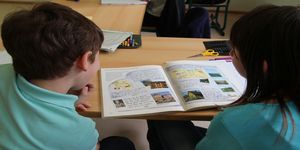Reading Recovery

There are a number of techniques and strategies that you can use to promote and encourage the development of reading in the class to stimulate the children’s enthusiasm and enable their progression. You should identify opportunities within the teaching week where the class can work on and develop their reading skills.
Set the children targets to achieve so that they can focus on improving their individual reading abilities. It is also important to gain parental support in their child’s reading so that the children can develop their skills when working at home. Encourage the children to read as many different types of text as possible so that they can become independent and fluent readers which will then support their work across the curriculum.
Reading Targets
It is vital to ensure that each child in the class has their own personal reading target which they can work towards across the half-term. You should get the class to review their reading targets at the end of each half-term so that the children can select additional targets to achieve in the remainder of the school year. Make sure that the selected targets are achievable such as reading independently for half an hour each day or reading pages in the book with less than five errors. Provide the class with some bookmarks which they can use to record their personal reading targets. The children can also keep a daily reading log of their steps towards achieving their targets.
Parental Support
It is also important to ensure that parents and guardians are fully involved in their child’s reading. You can share each child’s reading targets during after school meetings or through a reading target book. Encourage parents to visit the school library with their child at the end of the school day so that they can select texts to match their children’s targets. Use the children’s reading record to maintain a dialogue with parents so that everyone is aware of the steps that are needed to reach a particular target. Ask some parents to work in the classroom supporting the children’s reading as they access different subjects and topics in the curriculum.
Reading Across the Curriculum
One of the best ways of developing the children’s reading is by looking for opportunities across the curriculum where the children have to read a text to access and update their knowledge and understanding. For example, when studying Roman life in ancient Britain the class can work together to read some non-fiction texts or information extracted from websites to investigate how the Romans changed Britain by building roads. Choose individual children to read selected parts of any texts so that you can support their reading. Keep a record of children who have read to the class in other curriculum areas so that you ensure all pupils get an opportunity to develop their reading throughout the school year.
Guided Reading
Split the class into reading ability groups so that you can target specific skills with different children in the class such as scanning for information in a non-fiction text or developing comprehension skills when discussing the role of characters in a fiction story. During the guided reading sessions, you can provide the groups with short pieces of text from different text genres. Spend the majority of the sessions discussing the structure and format of the text with the group making sure that each individual child is challenged and encouraged to participate within a safe setting so that they can make and correct any mistakes. Encourage the groups to use open questions to discuss a text so that they can fully demonstrate their grasp of what has been read.
Whole Class Reading
If you have some suitable texts then you can also spend some time during the week when the whole class is reading together. This can involve the children reading the text chorally so that everyone is supported or you can select individual children to read parts of the text for the rest of the class to follow. Ensure that there is time built into any whole class reading session for the children to discuss what they have read and make predictions about future plot developments.
-

Theme Park Visit
Practise identifying and calculating the timing and duration of rides and events when visiting a theme park on a special family trip
-

Family Holiday Trips
Identify and record how to compose and publish recounts using adverbials of time and place to describe family holidays to different places in the world
-

Garden Numbers
Identify and model some of the different calculation techniques that can be used when adding pairs of single digit numbers
-

Summer Stories
Practise composing and presenting narrative stories with familiar settings to illustrate the events and experiences that could happen during the summer
